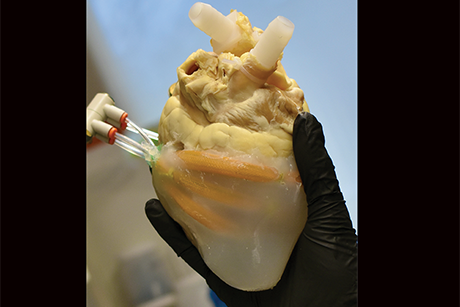Protecting seafarers and the global supply chain during Covid-19
The offshore and shipping industries are grappling with unique challenges in the face of the Covid-19 pandemic. The virus’ rapid spread on ships like the Diamond Princess and USS Theodore Roosevelt highlighted the health risks that the 1.2 million workers currently at sea face. Travel restrictions and closed borders offer an additional challenge by not only disrupting the global supply chain, but preventing scheduled crew changeovers from taking place.
To address these issues, the UN Global Compact Action Platform for Sustainable Ocean Business recently released recommendations developed by their Covid-19 Task Force. Thomas Peacock, professor of mechanical engineering, is a member of the task force, along with representatives from professional societies, international agencies, industry, nonprofits, and academia.
According to the International Chamber of Shipping, 90 percent of traded goods are transported via shipping. On a typical day, there are 50,000 vessels at sea, making a total of 4 million ports of call annually. Meanwhile, offshore platforms supply one third of the world’s oil and gas.
“The shipping and offshore industries are the heart of the global supply chains,” explains Peacock. “Governments need to take a unified approach to not only avoid disruptions to the international supply chain, but to protect the health of seafarers.”
Peacock has conducted research at sea for 15 years on global-class research vessels and aboard local coastal vessels all over the world — from the South China Sea to the Arctic. Peacock was originally connected to the UN Global Compact through the MIT Policy Lab at the Center for International Studies for his extensive work in deep-sea mining.
As Covid-19 began its global spread, the UN Global Compact focused on the associated challenges. They drafted a plan to operate in phases, or “short sprints.” “The goal of this first ‘short sprint’ has been to identify the most pressing issues and try and deal with them first,” adds Peacock.
The result is a list of 14 recommendations that help “ensure the continuing safe and efficient function of ocean-related supply chains during the Covid-19 pandemic.” One main theme that emerges from these recommendations is that in order to protect both seafarers and the global supply chain, a unified international response will be vital.
Ensuring the health and safety of seafarers
After the plight of cruise ships and news broke about the Covid-19 cases aboard the USS Roosevelt, concerns about the impact the pandemic may have on seafarers increased. “The USS Roosevelt will have world-class medical capabilities on board,” explains Peacock. “If that level of offshore vessel faced challenges coping with a Covid outbreak, you can appreciate the challenges facing a commercial shipping fleet.”
The most pressing issue the shipping industry will face in the next few weeks relates to the changeover of crew onboard that typically takes places each month. The crew on shipping vessels rotate over a certain period of time — usually a few months. Each month, roughly 100,000 seafarers change over, with crew members who have been at sea relieved by a new set of crew members once they arrive in port. At present, new data from the International Chamber of Shipping suggest the current number is at 150,000.
As travel bans and restrictions were put in place across the world in March and April, the typical crew changeover that would have occurred in mid-April was put on hold. Crew members currently at sea had their contracts extended. Additionally, repair work and inspections have been delayed. With many of the travel restrictions still in place, a solution for May is urgently needed.
“There comes a point when you have to switch people out from the ship, get new people on board, and make any necessary repairs to vessels and offshore platforms,” says Peacock. “And so, unless appropriate action is taken, there could be major challenges pending regarding the May crew changeovers.” He adds, “It is also important to recognize the selfless contribution that many seafarers have made in dealing with the situation throughout April by remaining at sea.”
One of the solutions the UN Global Compact Task Force recommends is classifying seafarers as “key workers” and deeming shipping and offshore activities an “essential service.” Doing so would help ensure the freedom of movement necessary to protect seafarers’ health and minimize impact to the global supply chain.
An international approach
Response to the spread of Covid-19 has varied widely across different countries. From quarantine measures to contact tracing and travel bans, government intervention has differed at the national, state, and local level. But when it comes to ocean supply chains, according to the UN Global Compact recommendations, a unified international approach is essential.
“If there are different rules and protocols in one country compared to another, this inevitably brings challenges,” explains Peacock. “As much as possible, there needs to be a unified approach and leading agencies such as the IMO, the ILO, the WHO, and many others have been working incredibly hard to develop protocols and recommendations.”
To help shape this international approach, the UN Global Compact Task Force has recommended the establishment of an Ocean Supply Chain Task Force in pursuit of “holistic and harmonized global cooperation and coordination to ensure the safety and integrity of ocean-related global supply chains.”
Another element that will need to be consistent across borders according to the UN Global Compact Task Force includes the certification and classification procedures
“Shipping relies on certification and classification programs that everyone has to abide by to be able operate,” adds Peacock. “Those take time to reassess, but there must be pragmatism in making certain allowances in light of this global pandemic.”
The recommendations outlined by the UN Global Compact Task Force serve as a first step toward addressing the threats Covid-19 brings to both the safety of those at sea and the integrity of the global supply chains.

